Logic Pro X is arguably one of the 'Big Three' DAWs available today. Used by professional producers, musicians, and composers the world over it, it boasts layers upon layers of music production features.
But in order to really dig deep into this fantastic bit of software, you'll need a hardware MIDI controller to boost your workflow.
Which is the best MIDI controller Logic Pro X users flock to?
That depends on a number of factors, such as what you use Logic Pro X for, and where you use it.
No matter what your needs are - whether it's a portable board, a full-size behemoth with weighted keys, or just a simple set of faders - we've got you covered. As Dennis Haysbert is fond of saying; "You're in good hands".
Know Thy Controller
It's important to know what we're talking about when we say 'MIDI controller'. The vast majority of MIDI controllers on the market are MIDI keyboards, some with added functionality, such as knobs, faders, and other gubbins.
But MIDI data is more than just the notes you play on a keyboard. It includes pitch bend and modulation data, expression control, and dozens of parameters that can manipulate virtual instruments. There's a wide range of MIDI controllers that can juice up your workflow in this area.
So as we run down the best MIDI controllers for Logic, in addition to looking at MIDI keyboard controllers, we'll also be dipping our toes into the gentle waters of non-keyboard controllers. All of the models we look at are bus-powered, though some have the option of using a dedicated power source (most often sold separately).
Pads-Only Controllers for Logic Pro X
While pad-based production feels like it belongs more in the Ableton Live universe, the new(ish) Live Loops feature in Logic lends itself to creating music in a non-linear fashion using MPC-style pads.
For those of you with flying fingers, here are our recommendations for Pad-Only MIDI controllers for Logic Pro.
1. Akai Pro MPD 218
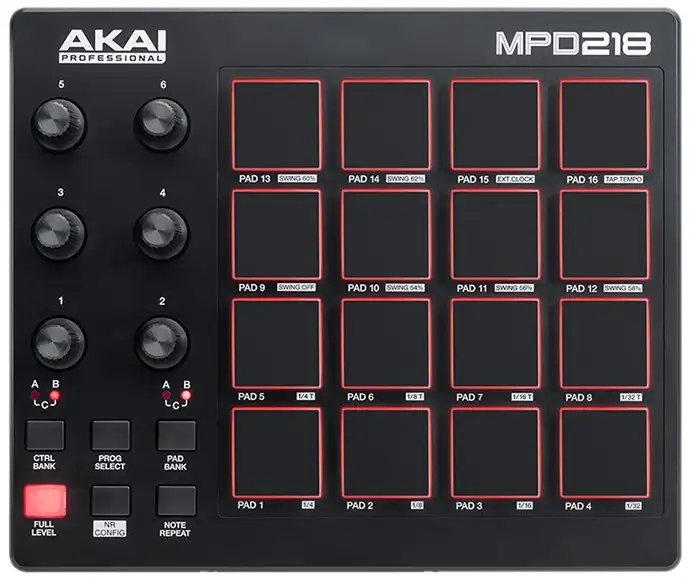
- 16 Backlit MPC Pads
- 6 endless rotary knobs
- 3 banks for pads and knobs
- 16 user-configurable presets
- MPC note-repeat and full-level features
The Low Down
The MPD 218 is an updated pad controller based on the groundbreaking original MPD hardware that created so many classic beats.
The controller features 16 thick and fat genuine MPC pads, which provide super-sensitive control over your beat-making procedures. Classic note-repeat and full-level features are available for cranking out huge urban beats, and three banks give you 48 pads worth of control.
Some users report double-triggering on the pads, but this is due to their sensitivity (the pads, not the users...). Like any instrument, you've got to learn how to play it!
On the left of the controller are 6 rotary knobs. Using the three banks, these can be assigned to take control of up to 18 MIDI parameters, such as volume, pan, filter cutoff, or effect parameters.
The MPD 218 ships with a bunch of beat-oriented software, and Ableton Live Lite. But you're a Logic user. Ignore that DAW. More importantly, the included Akai Software Preset Editor allows you to easily assign all the knobs and pads to to suit your workflow, and save them in any of the 16 customizable presets.
Although this article is focusing on MIDI controllers for Logic Pro, it's worth noting that the MPD 218 is also iOs compatible for those times when you just want to make beats on your iPad.
Who's It For? Ideal for producers, musicians, beat makers, and DJs who want to merge the feel of classic beat making with all the features Logic Pro offers.
2. Novation Launchpad Pro
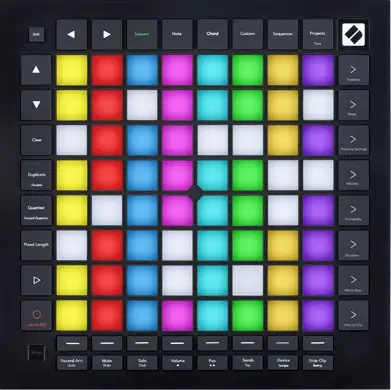
- 64 RGB backlit, velocity-sensitive pads
- Polyphonic aftertouch
- 4-track, 32-step sequencer
- Chord mode, dynamic note/scale mode
- Advanced integration with Logic Live Loops
- MIDI I/O connections (TRS type A for controlling external gear)
The Low Down
I know, I know. Novation is all about Ableton Live. But the Novation Launchpad Pro now includes functionality for Live Loops in Logic Pro X (version 10.6 and above), so this is a strong contender if you're the kind of producer who makes use of this Logic feature, and wants a pad-only controller.
Furthermore, the Launchpad Pro has MIDI I/O connections on the rear of the unit allowing you to control your hardware gear with, or without a computer.
Granted, some of the features on this controller are for Ableton alone, but you'll still get a lot of mileage out of it when paired with Logic. And with up to eight storable Custom Modes you can configure the Launchpad Pro to work the way you want it to with any MIDI-compatible hardware or software, making it a good option for performing live too.
And remember, the Launchpad is more than just a mass of drum pads. The pads can trigger and record chromatic material into Live Loops cells as well. Indeed, the chord and scale modes are great for getting those creative juices flowing. And don't forget about the onboard sequencer for those of you who like to sequence within sequences.
If the price tag is a little steep, or you feel you don't need all of these features, consider the Launchpad X. This baby brother is about half the price, although it doesn't come with as many features.
Who's It For? Composers and producers who like to sketch out their ideas in the Logic Pro X Live Loops environment, recording onto the timeline as they go.
Other Non-key Controllers for Logic Pro X
Next up, we're going to look at a couple of options that give you MIDI control in Logic, in the form of faders and buttons. These controllers don't have any pads or keys but do have a lot of functionality in terms of DAW control and mixing. They can also be used to record performance-enhancing CC messages such as expression, or filter cutoff.
1. Korg NanoKONTROL Studio
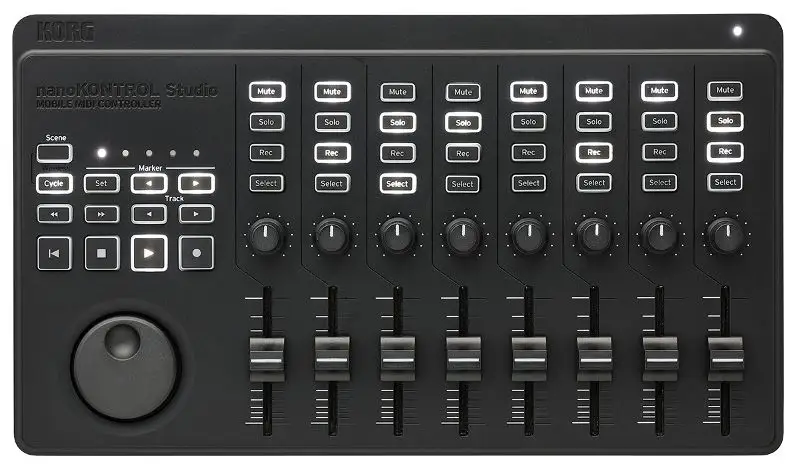
- 8 faders
- 8 rotary encoders
- 32 assignable buttons
- Transport controls, plus jog wheel, and marker placement
- Optional wireless connection via Bluetooth
The Low Down
The NanoKONTROL comes in various guises, but our vote goes for the Studio version. Taking up less space than a letter-sized sheet of paper, this MIDI controller is a great option for musicians who want the feel of a real mixing desk as they sculpt their sound.
The controller features a full transport section, including scene marker placement and recall. The eight faders come with their own set of four buttons each for mute, solo, record, and select, in addition to rotary dials.
What's more, all of these controls can be customized using the included editor.
What makes it great for Logic Pro X users? The NanoKONTROL auto-maps all its controls to Logic, making it a true plug-and-play unit.
If you're a mobile musician, you can ditch the USB connection and opt to use the Bluetooth MIDI connection to give you a clutter-free workspace.
And while the Logic Pro X software instruments are great, it never hurts to have more. The bundled software that comes with this excellent MIDI controller gives you access to some great synths and instruments, and a copy of Reason Lite. Rewire this into Logic, and you open up a whole new world of sonic possibilities.).
Who's It For? Musicians and producers who want tactile control over their mixing and MIDI environment, with minimal real estate.
2. Icon Pro Audio ICOC-PLATFORM M+
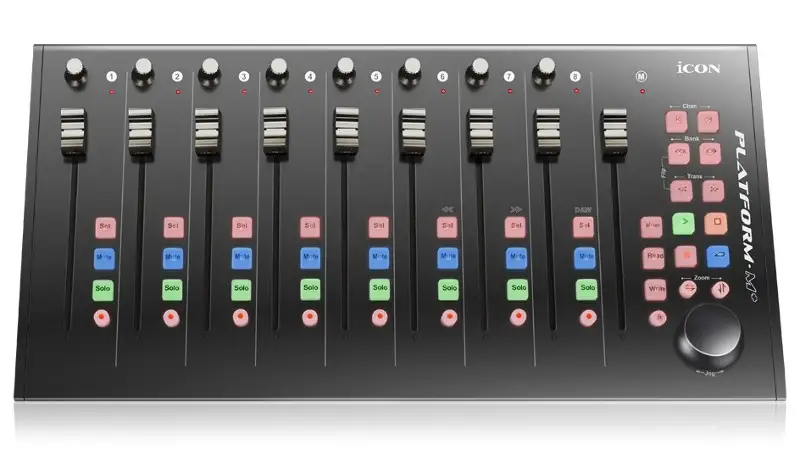
- 9 motorized faders
- 8 dual-function rotary knobs (rotate, and enter)
- Jog wheel shuttle
- Full transport control buttons
- Combine multiple units to extend to up to 64 channels
The Low Down
The Platform M+ from Icon Pro Audio is a step up from the NanoKONTROL in terms of price. Like the Korg controller, it features buttons and faders to make mixing your tracks a truly hands-on experience.
The main difference between the two units (aside from the price) is the motorized faders on the Platform M+, plus its ability to daisy-chain multiple units to give you access to up to 64 faders. Although at that point it's probably cheaper to buy an actual desk.
Still, motorized faders are great, and you can use the dedicated bank buttons to jump between tracks when you have just one unit.
The Platform M+ uses Mackie Control to communicate with Logic Pro - you'll need to add it via the control surfaces set-up menu in Logic. So, almost plug and play, but not quite.
MIDI functions can also be customized using the included iMap software, although some users report quirky fader behavior when using the unit in CC mode.
Who's It For? Musicians who are already set with their choice of keyboard controller, but want an analog desk feel for their mobile or studio mixing environments.
Portable Keyboard Controllers for Logic Pro X
Now we're turning our attention to MIDI keyboard controllers for Logic Pro. We'll start with smaller models that can fit easily into a backpack or messenger bag, for the nomadic musicians among you.
1. Akai MPK Mini MKIII
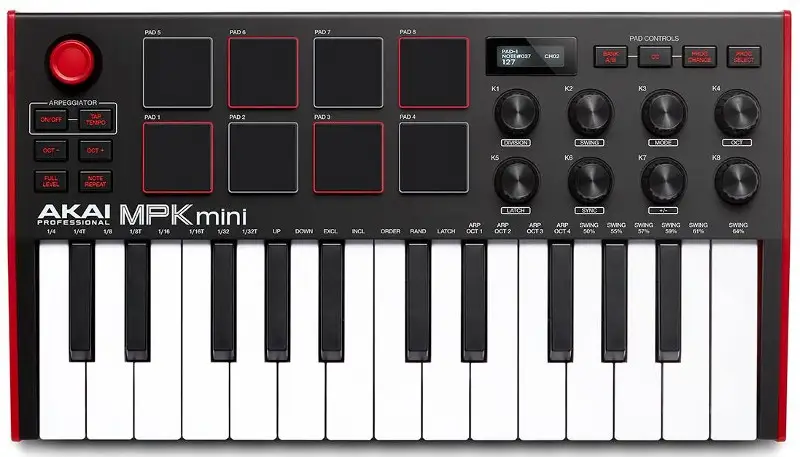
- 25 synth-action mini keys
- 8 performance pads
- 8 knobs (assignable)
- Pitch bend and modulation joystick
- Sustain pedal input
- Built-in arpeggiator
The Low Down
The MPK Mini is a hugely popular choice as a MIDI keyboard controller; Akai have been around since the dawn of time, and they know what they're doing.
This midi keyboard has smaller keys than you may be used to, but they actually feel pretty decent to play. Granted, you won't be knocking out any Chopin classics on it, but it's more than adequate for programming in bass lines, or chord progressions.
The MPC-style pads are a good size, especially considering the overall size of the controller, and are great for bashing out rhythms. They come in two banks, with note repeat and full-level features.
The rotary knobs can be assigned to MIDI parameters using the included editor, but the easiest way to get fiddling right away is to use the 'MIDI Learn' function in Logic Pro; select a parameter, press Command-L, and turn the knob of your choice on the MPK. Et, voila! You're in business.
While there's nothing specifically geared towards Logic Pro on the MPK, it's a solid choice for a musician who needs a low-profile, USB-powered MIDI keyboard for Logic that can be carted around easily.
Who's It For? The traveling producer working mainly with samples and sound manipulation, who doesn't need to play a lot of notes from a keyboard.
2. M-Audio Oxygen Pro 25
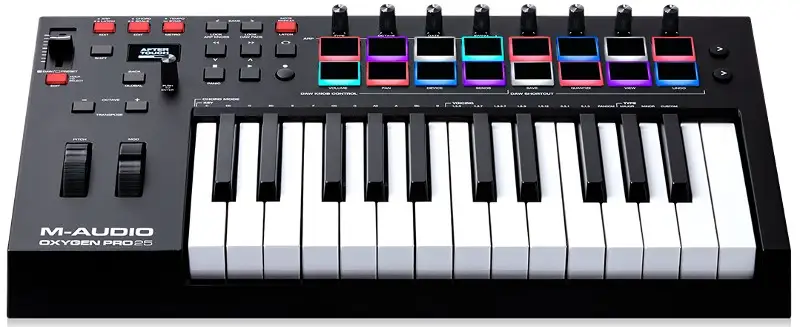
- 25 semi-weighted keys, with aftertouch and assignable zones
- 16 backlit RGB pads
- 8 assignable knobs and buttons
- 1 assignable fader
- Dedicated transport controls
- Smart chord and scale features
- Built-in arpeggiator
- Sustain pedal input
- 5-pin MIDI output
The Low Down
The excellent Oxygen Pro 25 MIDI controller from M-Audio is a great choice for Logic Pro X users who want portability, but have a little extra room in their backpack.
The Oxygen Pro is 7 inches wider than the Akai MP3 Mini and weighs a few pounds more. The extra space it takes up in your bag is worth it for the multiple additional features that the Akai lacks.
For starters, there are 16 pads, rather than 8. Admittedly, these are slightly smaller than the Akai, so something to bear in mind if you do a lot of pad-based programming.
There's a dedicated transport section, that is auto-mapped to Logic Pro - simply select it from the onboard preset menu and you're good to go.
The OLED screen provides visual feedback as you adjust controls, so you'll always be in, ahem, control.
An assignable fader gives you further manipulation possibilities over DAW or plugin parameters. Additional features include Smart Scale and Smart Chord modes, individual pitch and modulation wheels, and a 5-pin MIDI out connection.
Finally, the semi-weighted, velocity-sensitive keys with aftertouch are full-sized and feel great to play. It's a rare treat on portable and mini MIDI controllers, and opens up a new world of expression, especially when using some of the excellent synths that come with Logic Pro.
Who's It For? Musicians who need a compact, portable MIDI controller for Logic Pro, that's packed with enough features to make producing music a breeze.
3. IK Multimedia iRig Keys I/O
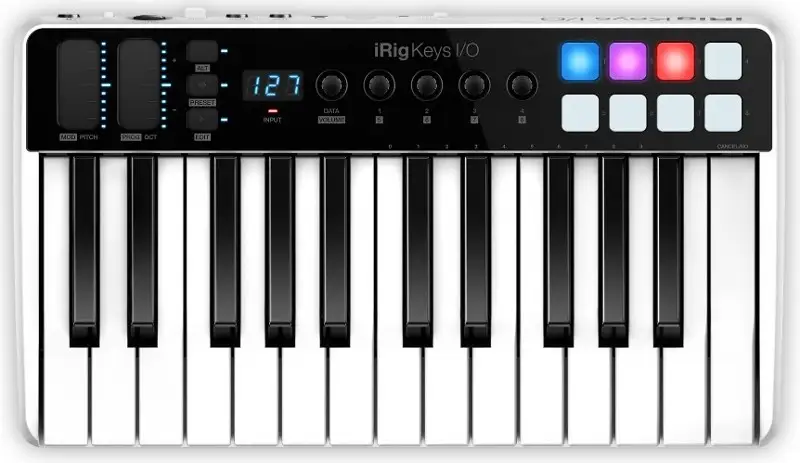
- 25 full-size, synth-action keys
- 8 RGB pads
- 5 encoder pots
- 2 touch-sensitive sliders
- 24-bit/96kHz audio interface, with:
- Neutrik combo input with phantom power
- 2 x 1/4" analog outputs
- 1 x 1/8" headphone out
The Low Down
Is it a MIDI controller? Is it an audio interface ? It's both!
If you're using Logic Pro X to record live sources on the go, and you need a portable controller keyboard, the IK Multimedia iRig Keys I/O is a great one-stop-shop solution.
As a MIDI controller, it offers 25 full-size keys for playing in instrumental parts, and 8 velocity-sensitive assignable pads for the finger drummers out there.
The rotary knobs can be assigned to MIDI CC parameters, and the 2 touch-sensitive fader strips, while defaulting to pitch bend and modulation, can also be assigned.
And when it comes to recording live sources, the Neutrik combo input will welcome nearly any microphone or instrument source and capture audio at a decent resolution.
The capabilities of the iRig Keys mean you can produce, record, and mix on Logic Pro with just a laptop, and an appetite for travel. While it's not as feature packed as the M-Audio Oxygen 25, it does provide a tidy solution for mobile recording and music production.
Who's It For? Mobile musicians who need a compact, all-in-one audio interface/MIDI controller to create music on the go in Logic Pro X.
49-Key Controllers for Logic Pro X
Next up, we're going to take a look at the best 4 octave MIDI keyboards for Logic Pro X. These keyboard controllers are portable enough to be used easily in live situations and functional enough to form the backbone of any studio set-up.
1. Akai MPK249
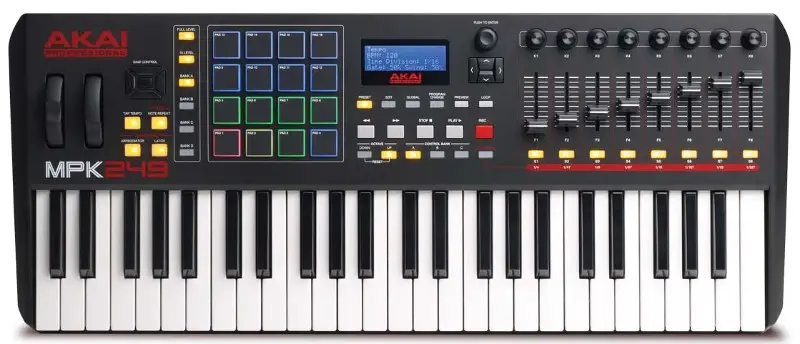
- 49 semi-weighted keys with aftertouch
- 16 velocity-sensitive MPC style pads
- 8 knobs
- 8 faders
- 8 assignable buttons
- Dedicated transport controls
- Sustain and expression pedal inputs
- MIDI I/O connections
The Low Down
We're heading into big boy territory with the MPK249, both in terms of the number of features and price. This 49-key MIDI controller from Akai is used the world over by professionals on stage and in the studio.
Like its little brother (the MPK Mini) the MPK249 has a built-in preset for Logic Pro X, making it simple to use right out of the box. The 24 Q-link controls will automatically map to Logic Pro X, but you can easily reassign them to suit your workflow, and save them in user presets.
When it comes to programming drum beats, the 16 velocity-sensitive pads will serve you well. While they may be a tad on the smaller side, they're exceptionally sensitive, and you can use the note repeat or full-level functions to get that authentic MPC-style programming groove.
The onboard arpeggiator, with groove and swing functionality, allows for creative exploration of new melodic ideas, and the addition of an expression pedal input leaves your fingers free for even more expressive parameter manipulation. And since the keys are aftertouch enabled, it's almost like you don't need the modulation wheel anymore.
Speaking of keys, the keybed on the MPK249 is solidly built, making piano passages come alive, with enough freedom of movement to let rip on widdly-widdly synth lines.
Since Logic Pro X comes with a great set of included software instruments and effects, I've not been focusing so much on the software bundles that come with these controllers. But I wanted to do a quick side note about the MPC Beats software that is included with the MPK Mini and 249.
While it is a standalone DAW in itself, it does also function as a plug-in within Logic, and the expansions selection has some great drum (and other) samples included. Also, the included Air Music Technology instruments are great and give you the opportunity to spend some time away from Logic-land instruments.
Who's It For? The professional Logic Pro X user who needs hands-on control over every aspect of their music production and a quality keybed to record performances with.
2. M-Audio Oxygen Pro 49
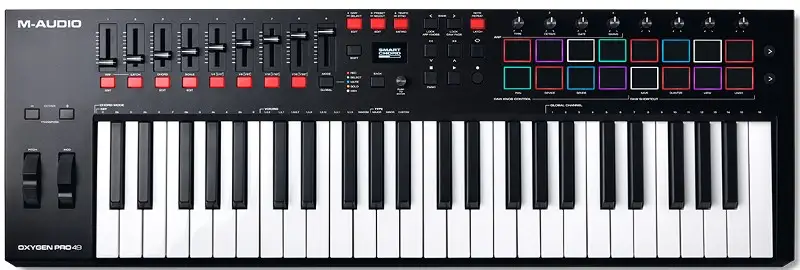
- 49 keys, semi-weighted, with aftertouch
- 16 RGB pads, with note repeat
- 8 knobs
- 9 faders
- Pitch and mod wheels
- Dedicated transport controls auto-mapped to Logic Pro X
- Sustain pedal input
- 5-pin MIDI out
The Low Down
Another offering from the Oxygen Pro range, this keyboard controller bears a lot of similarities to its baby brother, which we looked at earlier.
Aside from the number of keys, the other main difference is the addition of nine faders to give you even more expression when working with software instruments or to dominate your mix.
There's also a slightly larger OLED screen to make parameter mapping to the eight knobs or faders easy, right from the keyboard.
Everything else is more or less like the 25-key version; a great playable keybed; creative arpeggiator, smart chord and scale features; and auto-mapping of the transport controls to Logic Pro X from an onboard preset.
All in all, this is a solid keyboard, but I will point out the eight knobs are located right above the pads, which could cause accidental triggering while you're recording CC data from the encoders. Not a biggie, but worth noting if that kind of aesthetics bug the sh*t out of you.
Who's It For? Studio-based or mobile producers who want hands-on control over every aspect of their music production in Logic Pro X.
3. Komplete Kontrol S49

- 49 key semi-weighted, Fatar keybed with aftertouch
- Pitch and modulation wheels, plus touch strip
- 8 x touch-sensitive knobs
- 4-directional push encoder
- Dedicated transport controls for Logic Pro
- Sustain and expression pedal inputs
- Onboard arpeggiator, smart chord and scale functions
- MIDI I/O connections
- Software bundle includes a selection from Komplete Collection
The Low Down
The S49 from Native Instruments may not have all the bells and whistles of the previous MIDI controllers but for those of you who are heavily into the Native Instruments range of software instruments and effects, it's a smart choice for making your workflow even more efficient in Logic Pro X.
The S49 gives you access to editing, mixing, and transport controls in Logic Pro X right from the keyboard, and the two high-res color displays make it easy to see what you're doing. Whether it's editing parameters or metering the volume of a mix, you'll be able to keep track of your music production without taking your hands off the keyboard controller.
When you're arranging your tracks, you can browse sounds across the Komplete instruments range directly from the S49. Tag-based browsing makes it a cinch to find exactly the right sound for your track, and the 8 knobs are pre-mapped to the instrument you choose. And of course, you can edit the CC assignments on any of the controllers.
It's also worth noting that this integration extends beyond the instruments in the Komplete collection package. Any software developer that embraces the NKS standard is included in the integration, including the likes of Spitfire Audio, AAS, and Arturia.
If you already use the NKS instruments, the S49 will be a fantastic way of boosting your workflow in Logic Pro X. And if you don't own any NKS instruments but would like to dive in, the software bundle is a great entry point.
There's plenty more to say about the S49 as a MIDI controller for Logic; the excellent Fatar keybed; the ability to hook up an external MIDI gear; the onboard creative features. Suffice it to say if, like me, you're a Logic Pro X and Native Instruments fan this is a great MIDI controller for you.
Who's It For? Musicians who live (or would like to live) in the Native Instruments sonic universe, and need a dedicated keyboard controller for Logic Pro.
61-Key Controllers for Logic Pro X
61 key MIDI controllers for Logic Pro X are next on our list. While they take up slightly more real estate in your studio, they offer the ability to play more wide-ranging arrangements without resorting to the octave button.
1. Alesis VI61

- 61 full-sized keys, semi-weighted, with aftertouch
- 16 RGB pads
- 16 knobs
- 48 (!) buttons
- Dedicated transport controls
- Pitch bend & modulation wheels
- MIDI output connection
- Sustain pedal input
The Low Down
If you're looking for a great-feeling keyboard, with lots of options for parameter manipulation, that's also light enough to carry around, the Alesis VI61 could be your new best friend.
The keybed is excellent and feels great to play, as do the pads. The knobs and buttons are also sturdily built, with enough resistance to make transitions smooth.
The digital display will help you see exactly where you're moving parameters to, but it's a little small for programming customizable layouts. Luckily you can download the Alesis VI Editor to make reprogramming controllers a walk in the park.
There's no faders on this MIDI controller. But what the VI61 lacks in faders, it makes up for in buttons. 48 of them to be precise, all assignable to any MIDI parameter. You can even map them to keyboard shortcuts by using the Logic Pro X 'Learn' function, enabling you to open GUIs, and perform editing or bounce functions, all at the touch of a button. The hard part will be remembering which button is assigned to which function...
Who's It For? Musicians looking for an affordable MIDI controller for Logic Pro, with a great keybed and sturdy controllers.
2. Nektar Panorama P6

- 61 keys, semi-weighted, with aftertouch
- 12 pressure-sensitive pads
- 16 rotary encoders
- 10 faders (1 motorized)
- Transport controls, with deep integration for Logic Pro X
- 2 assignable pedal inputs
- MIDI out connection
The Low Down
When it comes to MIDI keyboard controllers, the Nektar Panorama is a beast. It has balanced, piano-style action from the semi-weighted keys; a whopping 93 real-time controls (including a motorized fader); dedicated communication with Logic Pro X; the ability to assign presets and QWERTY macros to buttons*; and a bright 3.5" color screen so you can track your parameter changes with ease.
What's more, if you like to Rewire other software into Logic (like Reason), the P6 will let you control either DAW by selecting it straight from the keyboard. And you can switch back and forth as often as you like without losing functionality.
In terms of setting the Nektar Panorama up with Logic Pro X, there are a few software and firmware hoops you need to jump through. But once this is done (and it is a smooth process) it works like a dream.
Another cool feature of the P6 is the ability to easily switch between a customizable Internal mode and the auto-mapped Logic DAW mode. The Internal mode is much easier for customizing control set-ups for software instruments, especially if you're trying to map multiple parameters and key switches.
I'm not sure there's much more you could ask for in a MIDI controller for Logic Pro, especially given the sub-$600 price tag. In fact, the only negative thing I can find about this MIDI controller is that the black-on-black layout of the main control section may be tricky to read.
*Sadly, the macro feature isn't available in OS X 10.11 or higher... :(
Who's It For? Serious producers and musicians who want to take their productivity in Logic Pro X to the next level.
88 Key Controllers for Logic Pro X
And finally, for the piano players out there who want the feel of weighted keys, we'll take a look at two of the best 88-key MIDI keyboards for Logic.
1. Roland A-88 MKII

- 88 fully weighted keys, with PHA-4 keybed
- 8 RGB pads
- 8 assignable knobs
- Pitch bend/modulation lever
- Sustain pedal input, plus 2 assignable pedal inputs
- MIDI In/Out
- Arpeggiator & chord memory features
- 3 user-definable zones
The Low Down
The Roland A-88 is primarily a MIDI controller for piano players who need just a little additional control over CC parameters. It doesn't have a lot in the way of pads/knobs/faders etc., but it does sport an amazing keybed that can be adjusted to suit your playing style.
The two additional pedal inputs give you the option of further controlling CC parameters using your tootsies - particularly useful if you're playing a two-handed string arrangement.
The pads and knobs can be assigned to any MIDI parameter, using the included control app. This also allows you to send custom colors to the A-88, and save your configurations as snapshots for easy recall while you work. An onboard arpeggiator and customizable zones add to the creative features on the A-88.
The humble number of controllers on this keyboard may be seen by some as a no-go. But if you need superior response in your keys, this is one of the best boards to go for. Roland keybeds will withstand anything your throw at them (I've tried), and if you pair this with a controller like the Korg NanoKONTROL you'll have access to everything you need.
A word of warning for anyone who hasn't used a Roland keyboard before: the combo pitch/mod lever is its own instrument to learn. It's easy to accidentally slide the pitch around while trying to add vibrato, or vice-versa.
Who's It For? Piano players who want a genuine ivory feel while they make music in Logic Pro X software, with some additional MIDI controllers.
2. M-Audio Hammer 88 Pro
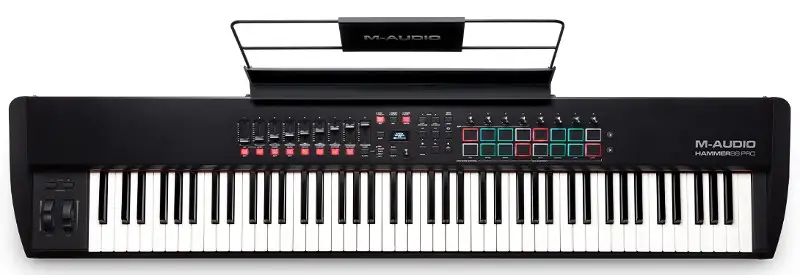
- 88 fully weighted, hammer action keys
- 16 RGB pads
- Eight knobs
- Nine faders
- Dedicated transport controls
- Pitch bend and modulation wheels
- 4 x pedal inputs (sustain, expression/CC, soft/footswitch/CC)
- MIDI In/Out
- Onboard arpeggiator
The Low Down
The Hammer Pro from M-Audio comes with a substantially lower price tag than the A-88, and a lot more controls. Added bonus; separate pitch and modulation wheels. Just sayin'...
In fact, the Hammer Pro is very much like the M-Audio Oxygen Pro with a larger octave range, and weighted keys.
It comes pre-mapped to Logic, so you can easily integrate it with your DAW; it has a bunch of pads, buttons and faders to regulate your MIDI parameters; and it has transport controls, so you can be Captain Kirk to your Logic's Starship Enterprise.
So, if you're looking for a full sized MIDI controller that can manipulate every aspect of your DAW, the Hammer Pro could be your dream come true.
Who's It For? The producer who wants it all.
That's a wrap! We hope you've found this rundown of the best MIDI keyboards for Logic Pro X useful in your quest to find the ultimate keyboard controller. There's something for everyone out there, so no matter how you produce music you'll find a device to make your creativity, well, more creative.
And don't forget once you've created your masterpiece, you can give it the final finishing touches right here on eMastered .





